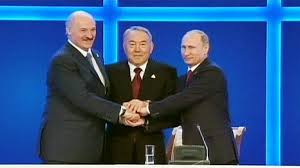 Kazakhstan sent its currency lower last week after businesses complained that Russian companies had flooded domestic markets with cheaper goods. In Belarus, the Eurasian Economic Union’s last founding member, the nation’s trade deficit with Russia widened by a quarter last year.
Kazakhstan sent its currency lower last week after businesses complained that Russian companies had flooded domestic markets with cheaper goods. In Belarus, the Eurasian Economic Union’s last founding member, the nation’s trade deficit with Russia widened by a quarter last year.
Putin’s vision for his ex-Soviet trading bloc, already curtailed by the war in Ukraine, is suffering widening divisions among members as oil prices and sanctions weaken the ruble and shrink Russia’s economy. Already wary of Russia’s dominant role, the reaction to some of its companies’ actions risks damaging the union’s goal of closer integration.
“Because of the creation of a united economic zone, Kazakhstan and Russia, especially metals producers, entered into a trade war,” Vladimir Kim, majority shareholder of London- listed KAZ Minerals, said as entrepreneurs met Kazakh President Nursultan Nazarbayev after Thursday’s devaluation.
The ruble is the past year’s worst performer against the dollar, sinking 49 percent, data compiled by Bloomberg show. Belarus’s ruble has tumbled more than a third, losing 4.9 percent on Monday alone, while the currencies of Armenia and Kyrgyzstan, the Eurasian Economic Union’s two newest members, have lost 15 percent and 16 percent.
Reconquering Markets
Kazakhstan’s decision to float the tenge sparked a 22 percent decline to the dollar. The currency, down 3.7 percent Tuesday, is “trying to find a balance” and will then track oil prices, like Russia’s ruble, according to Damir Seisebayev, head of research at Private Asset Management in Almaty.
The devaluation was cheered by producers who’d lost out to Russian rivals. Businesses grumbled to Prime Minister Karim Massimov in June about surging grain and coal imports. Car shipments from Russia doubled in the first five months.
Another example is metals. Imports of Russian steel products, non-existent in 2013, will equal half of the country’s total output this year, Vijay Mahadevan, ArcelorMittal Temirtau’s chief executive officer, estimated last month on his blog. His company delayed plans to cut pay by a quarter after the tenge’s devaluation.
“The free float of the tenge will help Kazakh metal and coal producers reconquer their traditional markets,” Nikolai Radostovets, executive director of Kazakhstan’s Association of Mining and Metallurgical Enterprises, said Friday.
‘Some Empire’
The trade accusations add to friction inside the bloc. Russia’s ban on European food imports, a response to sanctions over Ukraine, has disrupted transit to Kazakhstan and Belarus, while Putin’s leading role has caused unease.
There’s no immediate prospect for a common currency or deeper integration, according to Belarusian President Aleksandr Lukashenko, who said in April that neither his nation nor Kazakhstan are ready to become “a member of some empire.”
The tension also belies a March pledge by Russia, Kazakhstan and Belarus to stick together in the face of declining energy prices and sanctions. While Nazarbayev spoke of the need “to develop a common plan of action,” officials are still deciding when to discuss coordinating monetary and budget policy, Russia’s RBC Daily newspaper reported Monday.
Kazakhstan didn’t inform Russia in advance of its devaluation plan, according to Massimov, the nation’s premier.
“This is a sovereign right for Kazakhstan to make such kind of decision,” he said Saturday in an interview. “That’s why we did it ourselves.”
‘Lead Violin’
Nazarbayev, whose nation is also grappling with a weaker currency in China, its second-largest trading partner behind Russia, has sought to calm nerves. He steered clear of blaming Russia, saying instead that some businesses had taken advantage of currency disparities.
“I’m not criticizing anyone -- Russia lives in difficult conditions, sanctions, China also has things going on,” he said. “In market conditions, you understand, just as we can’t force you to do unnecessary things, so they can’t. Every business makes use of the situation.” He said that “the only way forward is competitiveness.”
That view may not be enough to temper unease with Putin’s union.
Russia is the “lead violin in the integration process, so it has an influence on what’s happening in Kazakhstan,” Alexei Portanskiy, a professor at the Higher School of Economics in Moscow and a specialist in trade policy, said by phone. “Now the Eurasian Economic Union is going through additional problems because of the crisis in Russia.”
--With assistance from Olga Tanas in Moscow and Aliaksandr Kudrytski in Minsk, Belarus.
The Washington Post, 25.08.2015




